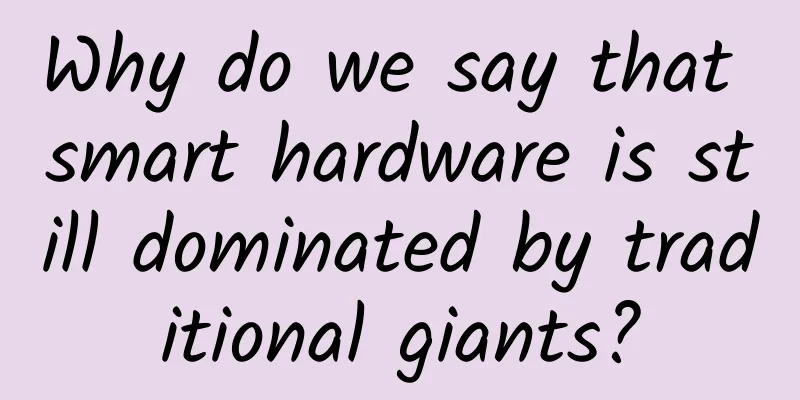Why do we say that smart hardware is still dominated by traditional giants?

|
During the National Day holiday, the smart hardware company inWatch revealed that it had been in arrears of three or four months of salary. This company, which had raised A+ rounds, was once regarded as a star representative of smart hardware startups. The top management frequently changed, and employees went online to demand their salary and defend their rights. However, this news did not attract much attention, including the media and self-media, and few people discussed it. One cannot help but sigh that smart hardware is really different from the past. Is the Internet smart hardware startup really unreliable? How can smart hardware have a future? The ending and current situation of Internet giants making hardware In July this year, when talking about the field of smart hardware at the Innovator Summit, Zhou Hongyi admitted that 360 had failed in the layout and development of smart hardware. "One of the most important reasons for the failure of many smart hardware products, including many failed products we have made ourselves, is that there is no demand at all." 360 has various smart hardware such as children's watches, driving recorders, smart cameras, children's robots, routers, etc., but the overall data performance is disappointing, and it has not reproduced the antivirus software's invincible and powerful momentum. In fact, it is not just 360, several other giants are also not doing well. Tencent's Lubao Box, WeChat Earphones, QQ Music Speakers, etc., Alibaba's Aliyun Phone and other hardware, Baidu's Baidu Yi Phone, Baidu Video Stick, Baidu Gudong Bracelet, Baidu Bicycle, basically all of them are in a mess after the excitement. The most popular company is Xiaomi, an Internet company that has overturned the domestic mobile phone market in China. It once became the fastest growing company in the world because of its e-commerce and fan economy marketing model. Its valuation once reached 45 billion US dollars. It has covered the fields of wearables, health, security, power supply, home furnishing, decoration, lighting, luggage, air purification, and water purification, with the intention of occupying the entire smart home ecosystem. But this year, this Internet giant, known as the fourth pole outside of BAT, also encountered stagflation in growth. Xiaomi's sales in 2015 only increased by 3%, and there was even a rumor that Xiaomi's valuation plummeted to 4 billion US dollars. Although it turned out to be a misunderstanding, it was enough to show that Xiaomi's growth and development were indeed abnormal. In addition, the controversy over plagiarism and piracy has never stopped. Xiaomi's Mi Rabbit Story Machine is suspected of plagiarizing Baby Cat products, Xiaomi's air purifiers and rice cookers are suspected of plagiarizing similar products from MUJI, and the appearance of the Xiaoyi surveillance camera imitates the camera products of the EZVIZ brand under the security giant Hikvision... This once industry giant is plagued by negative news. All signs indicate that Internet giants have mastered various networks and innovative models, but when it comes to the tough nut of smart hardware, they just can't handle it or they run into obstacles everywhere. Smart hardware seems to have become the Waterloo of the giants' development. Why can’t the Internet do hardware? Zhou Hongyi, who dominated the antivirus market by defeating traditional antivirus software such as Rising with a free model, also wanted to use the same model to bring down the giants of smart hardware and replicate the glory and achievements of the Internet era. However, it turned out to be a dead end. Zhou Hongyi summed up the failure of 360 hardware by saying: "Smart hardware cannot be made with a free model according to Internet logic. Currently, many smart hardware solves false needs. Real smart hardware should make money and needs to cooperate with artificial intelligence services." "Real smart hardware should make money." This simple truth is a huge trap for many Internet companies when they enter the smart hardware industry. When many Internet companies make smart hardware, they overemphasize Internet services, feelings, happiness, and cheapness, which deviates from the essence of hardware. A hardware product, no matter how many concepts and ideas are artificially given, is essentially a real physical device for users. The basic law of the market is that you get what you pay for. There is a world of difference between a camera that costs hundreds of dollars and one that costs dozens of dollars. In a recent media interview, Lei Jun said that he would personally go to Samsung's headquarters in South Korea to ask for screens. Please note that this is not a simple order. Lei Jun admitted that this industry chain is not something that entrepreneurs can solve just because they want to. Every field in the industry chain has formed a near-monopoly giant, including processors, screens, and many other fields. There are world-class players. The complete hardware production process is extremely complex and involves many links. Even if you are as passionate as Luo Yonghao, you cannot avoid this process in the field of smart hardware: concept design, appearance design, component and supplier selection, structure development, circuit design, software and firmware development, thermal design, electromagnetic compatibility, mold opening, packaging design, supplier certification, procurement and material preparation, production line trial production, internal and public testing, mass production, quality control, warehousing, logistics, channel construction, marketing promotion, customer service, payment collection, after-sales service... and other complicated links. Jiang Haiqing, CEO of EZVIZ Networks, who has been immersed in the hardware industry for decades, believes that some Internet companies entering the field of smart hardware nowadays tend to adopt a model of outsourcing design companies to do design, OEM factories to do manufacturing, and then OEM to put on shelves. In fact, they do not have core R&D and supply chain management capabilities, nor do they invest in the construction of hardware sales channels. They try to adopt a mentality of quick success and instant benefits, and use the so-called "Internet thinking" to piece together a product, and "subvert" a certain industry by using low prices or even subsidizing users. Similar practices may produce certain explosive effects in the short term, but in the medium and long term, due to the lack of control over core technologies, lack of lean manufacturing capabilities for the supply chain, lack of efficient operation of various sales channels, and the use of "diaosi" marketing methods, even at the expense of brand image, in the long-term market competition, these businesses cannot make normal profits, gradually lose the reputation and recognition of users, and eventually lead to the obvious decline of their competitiveness and abandonment by users. If smart hardware is made in this way, no company, including Internet companies, can achieve lasting success. Is smart hardware dead? Smart hardware was very popular in 2013-2014, and it was everywhere. Now almost no one mentions it, and even some companies have closed down. The roller coaster-like development has made many people question whether the development of smart hardware has burst the bubble and is simply a false demand. However, another piece of news is worth pondering. Research company Erpoint Research released a report saying that in the third quarter of this year, OPPO and vivo surpassed Huawei and Xiaomi at the same time to become the top two smartphone manufacturers in the Chinese market. These two companies have always been classified as traditional mobile phone companies. At a time when many emerging models such as fan economy, Internet marketing, and new media conversion are constantly being defined and sought after, there is a very obvious trend that companies in traditional industries are catching up and surpassing Internet companies in the field of smart hardware after a short period of exploration and learning. For example, in the field of mobile phones, Huawei, OPPO, and vivo have surpassed Xiaomi and Meizu. In the field of smart homes, many traditional home appliance companies are also doing better than Xiaomi. In the field of smart video, judging from the Tmall Double 11 event alone, EZVIZ has clearly surpassed Xiaoyi and 360. Facts have proved that it is not that smart hardware is no longer viable, but that the model of some emerging Internet companies that blindly pursue concepts and empty talk is no longer viable. The steering and development of smart hardware will eventually be handed over to traditional companies in various industries that have been immersed in the entire ecological chain including technology, supply chain, R&D, sales channels, etc. for many years. However, with the development of the Internet, traditional companies are also keeping pace with the times, constantly learning and adapting to various marketing and communication models, and actively becoming more Internet-based and agile. Huawei has learned from some of the characteristics of the Internet, Haier has made a big move into smart homes, OPPO has invested heavily in new media communication and marketing, and Hikvision's EZVIZ has entered home security and visualization services for small and micro enterprises. Traditional hardware giants are catching up, and traditional companies are no longer traditional. The Internet is no longer the patent of Internet companies, but a methodology and tool. All industries can use the Internet to optimize, improve, and break through their own businesses, but it is not something that Internet companies can do in a short time to supplement the entire chain. The intelligentization of traditional hardware is an irreversible trend. The current fluctuations and adjustments are a process of eliminating the dross and retaining the essence. It is a spiral upward stage for every industry to move forward. However, the final home ground will still belong to those companies that have core technical capabilities, focus on the industry and absorb the spirit of the Internet. As a winner of Toutiao's Qingyun Plan and Baijiahao's Bai+ Plan, the 2019 Baidu Digital Author of the Year, the Baijiahao's Most Popular Author in the Technology Field, the 2019 Sogou Technology and Culture Author, and the 2021 Baijiahao Quarterly Influential Creator, he has won many awards, including the 2013 Sohu Best Industry Media Person, the 2015 China New Media Entrepreneurship Competition Beijing Third Place, the 2015 Guangmang Experience Award, the 2015 China New Media Entrepreneurship Competition Finals Third Place, and the 2018 Baidu Dynamic Annual Powerful Celebrity. |
<<: Toyota Gazoo Racing to become high-performance brand
>>: Toyota Supra spy photos: details similar to FT-1 concept car
Recommend
The latest TOP 10 reasons for IOS review rejection!
At present, the machine review mechanism is becom...
Information flow promotion optimization strategy, do this well to achieve 80% success!
Seeing the world through our eyes is an innate ab...
How to identify mini-programs using WeChat? WeChat Mini Program question: How to identify the QR code?
Q: How to identify mini programs using WeChat? We...
How to check the popularity of keywords in Baidu promotion? Is there any tool?
The keyword tool is a powerful assistant that hel...
The latest footage of the 6.9-magnitude earthquake in Hualien County, Taiwan Island: The bridge collapsed and the rider captured the moment of the landslide
According to official measurements by the China E...
New regulations on the payment of one-child allowance in 2020: how much is it per year?
New regulations on the payment of one-child allow...
Panasonic asks Porsche for help to grab the high-end market, but Chinese home appliance companies are not buying it
The biggest puzzlement of a group of foreign bran...
WeChat vs. TikTok: Analysis report on 4 major categories!
In 2019, WeChat’s monthly active users reached 1....
Don’t say “pink and tender”, it is the real version of “beautiful scenery in the desert”
There are countless magical and beautiful plants ...
Shandong college entrance examination facial recognition no longer requires candidates to put fingerprints on the sign-in sheet
On July 3, the Information Office of the Shandong...
How Web developers make games from "2048"
The past few weeks have been a long and crazy tim...
Meituan Grocery APP Product Analysis
The growth of user scale and the maturity of deli...
How did Lao Luo, who has feelings, manage this event?
Although netizens always jokingly say that watchi...









